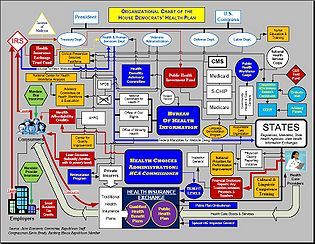Socialized medicine
 From Conservapedia - Reading time: 6 min
From Conservapedia - Reading time: 6 min

Socialized Medicine is health care as supplied by a monopolistic or heavily subsidized and regulated universal health care State system.
Contents
2009[edit]
Health care funding was the major political issue of 2009, with the Republicans in near-solid opposition and the Democrats divided. On November 7, 2009, the House passed its version, the "Affordable Health Care for America Act" (H.R. 3962). It would cost $1.1 trillion but now goes to the Senate where its fate is uncertain.
It just barely passed 215-210, as 39 Democrats deserted Speaker Nancy Pelosi's leadership; only one Republican voted yes. Pelosi, a liberal, is a strong supporter of abortion but to get the 215 votes she had to give in to Catholic leaders nationally and abortion opponents in her own caucus and allow passage of the Stupak Amendment. The amendment imposes tight restrictions that bar any insurance plan that is purchased with government subsidies from covering abortions. As a result, numerous liberals denounced the bill even as they voted for it.[1]
Conservative counter-arguments[edit]
Loss of incentives to create new drugs/treatments[edit]
The White House Council of Economic Advisers issued a report in June 2009 explaining the Obama administration's goal of reducing projected health spending by 30% over the next two decades. That reduction would be achieved by eliminating "high cost, low-value treatments," by "implementing a set of performance measures that all providers would adopt," and by "directly targeting individual providers . . . (and other) high-end outliers."
Obama emphasized the importance of limiting services to "health care that works." To identify such care, he provided more than $1 billion in the American Recovery and Reinvestment Act of 2009 to jump-start Comparative Effectiveness Research (CER) and to finance a federal CER advisory council. Comparative effectiveness would become the vehicle for deciding whether each method of treatment provides enough of an improvement in health care to justify the cost. The existence of such a program in the U.S. similar the British NHS's Quality Adjusted Life Year (QALY) would not only deny lifesaving care but would also cast a pall over medical researchers who would fear that government experts might reject their discoveries as "too expensive."[2]
New Tax[edit]
If an individual fails to purchase coverage and does not meet the exceptions or the religious exemption, then a financial penalty will be assessed. Under this particular proposal for Obamacare care, the penalty is calculated by multiplying the number of uncovered months times the weighted average of the monthly premium for a plan in the person’s coverage class and coverage area, plus 15 percent.[3]
Reagan[edit]
In 1961 (while still a Democrat), Ronald Reagan took part in Operation Coffee Cup and in part here is what he said: [1]:
| “ | One of the traditional methods of imposing statism or socialism on a people has been by way of medicine. It's very easy to disguise a medical program as a humanitarian project. . . . Now, the American people, if you put it to them about socialized medicine and gave them a chance to choose, would unhesitatingly vote against it. We have an example of this. Under the Truman administration it was proposed that we have a compulsory health insurance program for all people in the United States, and, of course, the American people unhesitatingly rejected this.
The doctor begins to lose freedom. . . . First you decide that the doctor can have so many patients. They are equally divided among the various doctors by the government. But then doctors aren’t equally divided geographically. So a doctor decides he wants to practice in one town and the government has to say to him, you can't live in that town. They already have enough doctors. You have to go someplace else. And from here it's only a short step to dictating where he will go. . . . All of us can see what happens once you establish the precedent that the government can determine a man's working place and his working methods, determine his employment. From here it's a short step to all the rest of socialism, to determining his pay. And pretty soon your son won't decide, when he's in school, where he will go or what he will do for a living. He will wait for the government to tell him where he will go to work and what he will do. |
” |
 KSF
KSF